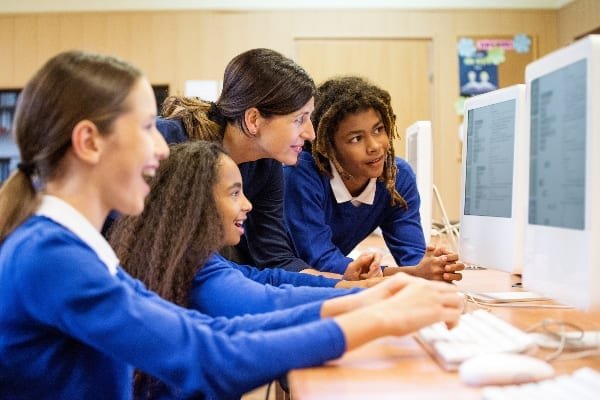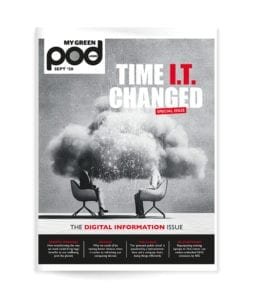This article first appeared in our Ethical Shopping issue of My Green Pod Magazine, distributed with The Guardian on 30 October 2020. Click here to subscribe to our digital edition and get each issue delivered straight to your inbox
When schools went into lockdown, my sons had very different experiences.
One was in primary school and had no remote teaching at all – and by teaching I mean the actual act of teaching as I see it: imparting knowledge from one human to another, rather than sending home worksheets.
My other son’s school started out badly but got better, though only around 30-40% of his curriculum was being ‘taught’ in live virtual lessons.
When I enquired into the reasons for this, I was given three: the teachers didn’t want to conduct lessons online, there were issues around data protection and privacy and the digital divide meant that not all children would have access to devices. So rather than levelling up, as we had been promised, education was being levelled down.
It seems that many school pupils had a very similar experience. According to research from University College London, seven out of 10 children from state schools had a maximum of one online lesson per day, while almost a third of private schools were providing four or more lessons.
Ofcom estimates that in the UK, between 1.14 and 1.78 million children (around 9%) have no home access to a laptop, desktop or tablet. In many cases, devices that are available are shared between entire families, so access doesn’t necessarily guarantee good quality access.
Nevertheless, I was fairly shocked to be given this as a reason for a school not to be providing live lessons.
Joining the dots
At work I was devising a marketing campaign around sustainable I.T.; one of the pillars was around the reuse of devices to reduce the greenhouse gases (GHGs) emitted during manufacture (embodied emissions) and any harmful toxins emitted during a device’s destruction.
I remembered a message I’d received from Keith Sonnet, CEO of Computer Aid – an organisation that is ISO and GDPR certified to take old computer equipment away, wipe it, rebuild it and usually send it to the developing world.
I also thought about two initiatives I’d been involved with: Vodafone’s Instant Classrooms and Instant Network Schools, which were effectively ‘classrooms in a suitcase’ used to create schools in refugee camps.
I wondered whether there could be a way to combine Citrix technology, old devices, Computer Aid’s facilities and public goodwill – as seen through the ventilator challenge – to solve the problem.
I spoke to our techies and Keith at Computer Aid, and it seemed the answer was a resounding yes.
PCs get a digital makeover
Gerry Lavin, product marketing manager and Northern Europe sustainability lead at Citrix, explains how it could work: ‘One of the goals of Citrix technology is to decouple work from locations. People need spaces to be creative and productive. People also need spaces in which they can learn, develop and thrive. The technology that allows someone to access any application from any location can also play a role in levelling the access to online education.’
In the words of William Gibson, ‘The future is already here — it’s just not very evenly distributed.’ To give broader access we need to rethink how we deliver educational services.
‘In a world where cloud computing is ubiquitous, the majority of students do not need a high-specification device as their endpoint’, Gerry explains. ‘Older and lower powered
devices can provide the same great educational experience; an old, unloved device – potentially on its way to landfill – can be given a new lease of life.’
One interesting approach is the CloudReady solution from Neverware, which can turn any device – like an old computer sitting idle in the office – into a Chromebook.
One third of PCs were ‘furloughed’ during lockdown and not actively used. With a digital makeover, an unused device can become an educational tool that supports distance learning while schools are closed.
‘Not every application is available in Chrome and there are many Mac and Windows devices out there’, Gerry continues. ‘That’s where a digital workspace solution like Citrix Workspace becomes essential.’
Regardless of the operating system or capability of the device, a student with Citrix Workspace can access all the applications and data they need. They will get a secure and performant experience without any unnecessary friction. The University of Cambridge took advantage of this approach and replaced power-hungry computers with efficient and inexpensive Raspberry Pi devices.
 Play Video about This Rock Might Just Save The World
Play Video about This Rock Might Just Save The World Play Video about Play 2 hours of rock
Play Video about Play 2 hours of rock Play Video about Play 2 hours of brook
Play Video about Play 2 hours of brook Play Video about Play 2 hours of sheep
Play Video about Play 2 hours of sheep















































